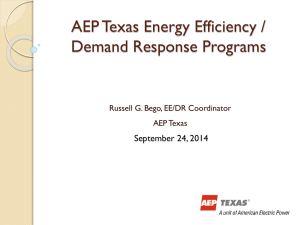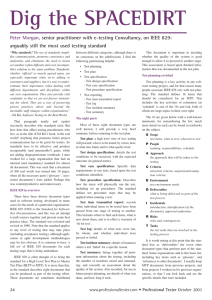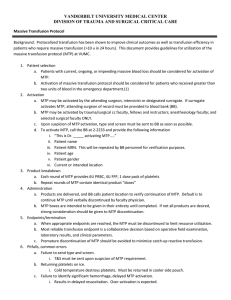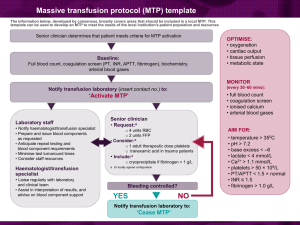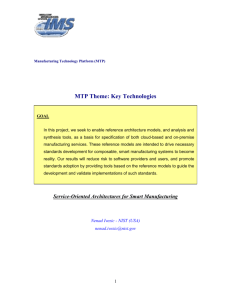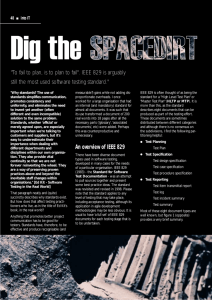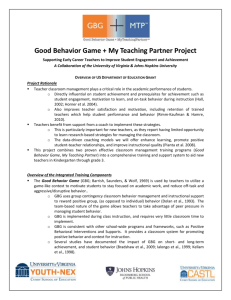IMS MTP SSC Rev 3
advertisement
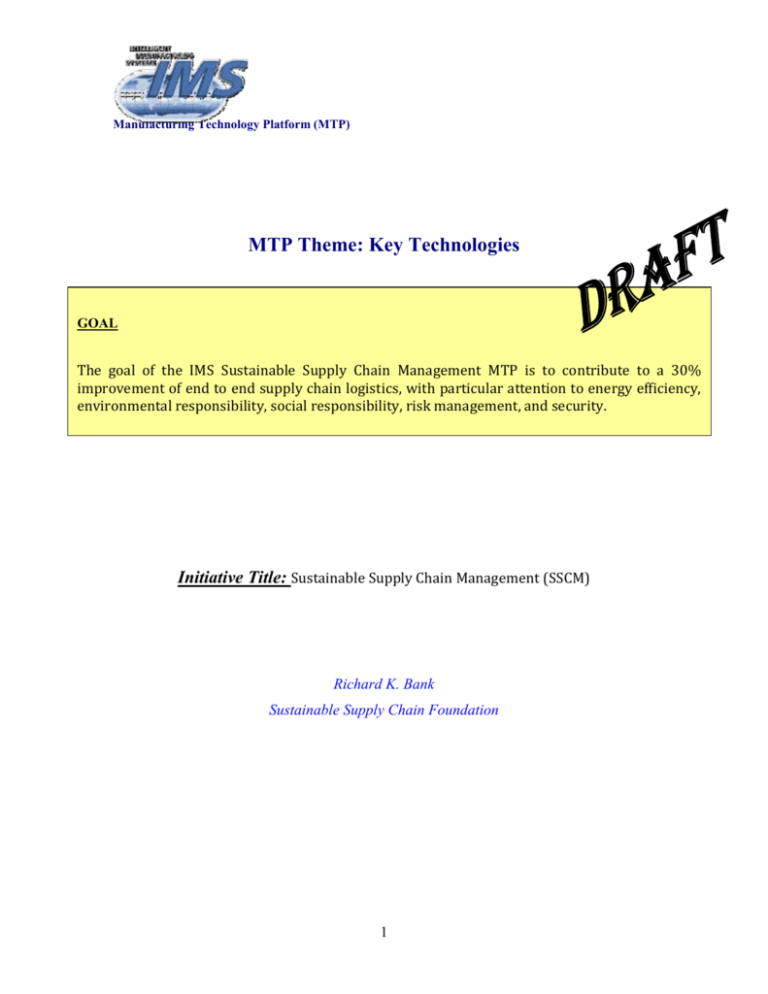
Manufacturing Technology Platform (MTP) MTP Theme: Key Technologies GOAL The goal of the IMS Sustainable Supply Chain Management MTP is to contribute to a 30% improvement of end to end supply chain logistics, with particular attention to energy efficiency, environmental responsibility, social responsibility, risk management, and security. Initiative Title: Sustainable Supply Chain Management (SSCM) Richard K. Bank Sustainable Supply Chain Foundation 1 Manufacturing Technology Platform (MTP) TABLE OF CONTENTS 1 INITIATIVE TITLE: SUSTAINABLE SUPPLY CHAIN MANAGEMENT................... 3 1.1 R&D OBJECTIVES ................................................................................................................. 3 1.2 OVERVIEW OF THE INITIATIVE ............................................................................................ 4 1.3 PLANNED WORK, RESOURCES AND TIMING ....................................................................... 4 1.3.1 PLANNED WORK .................................................................................................................. 4 1.3.2 RESOURCES.......................................................................................................................... 5 1.3.3 TIMING ................................................................................................................................. 6 1.4 PARTICIPATING REGIONS, PROJECTS INVOLVED AND PARTNERS .................................... 6 1.5 CONTACT INFORMATION ...................................................................................................... 6 2 Manufacturing Technology Platform (MTP) 1 Initiative Title: Sustainable Supply Chain Management 1.1 Background & Motivation This document with a “Rev” filename extension is a working draft. Comments and ideas are welcome. Sustainable supply chain management involves integrating environmentally and financially viable practices into the complete supply chain lifecycle, from product design and development, to material selection, (including raw material extraction or agricultural production), manufacturing, packaging, transportation, warehousing, distribution, consumption, return and disposal. Environmentally sustainable supply chain management and practices can assist organizations in not only reducing their total carbon footprint, but also in optimizing their end-to-end operations to achieve greater cost savings and profitability. All supply chains can be optimized using sustainable practices. For many organizations logistics supply chains may have a far greater impact on the environment that any other part of their operations, such as manufacturing. While most corporate and public focus has been on the sustainable profile of a product, (i.e. its source and whether it is recyclable), there is a need to spotlight and to understand the sustainability issues related to the transportation and distribution of those products. Due to commercial, regulatory, and competitiveness pressures, there is the need for global collaboration in the area of sustainable supply chain management. As a starting point, the two co-leaders of this IMS MTP project lead signature umbrella research efforts in this field in their respective IMS regions. These are the Sustainable Supply Chain Foundation of the USA which is dedicated to the topic and the Zaragoza Logistics Center in Europe which is launching a European Technology Platform on supply chain logistics which will bring industry together to help the European Commission shape future research call topics within Horizon 2020. 1.2 R&D Objectives The following Objectives are brainstorming. discuss. Please review, comment, add, delete, Objective 1: To conduct market research to identify industry SSCM research needs and concerns with the intent to develop abstracts/recommendations to funding bodies for future research call topics Objective 2: Identify and formalize key sustainability logistics metrics for energy savings, efficiency, resilience, security and social responsibility in the warehouse itself 3 Manufacturing Technology Platform (MTP) (structure), as well as in the manufacturing and assembling processes (and other value added services) which take place in the warehouse as an extension of the manufacturing which occurs in the principal factory or manufacturing facility. Objective 3: Analyze supply chains to optimize “how to transport” and “what to transport.” Objective 4: Apply the concepts developed to industrial use cases and evaluate the results. Objective 5: Create a metrics-based sustainability assessment service, with independent verification. Objective 6: Exploit and disseminate the results to scientific and industrial organisations including standardisation bodies. 1.3 Overview of the Initiative This MTP project is designed as an umbrella initiative, under which a number of ongoing research projects in the participating regions can collaborate. It will amplify existing activities and organizations such as the MIT Global Scale Network and the Sustainable Supply Chain Foundation, by using the IMS member regions to further expand the nature and number of participants tackling this multi-aspect problem. Participants will play roles ranging from research, certification services, industrial pilots, standardization, and dissemination. 1.4 Planned Work, Resources and Timing The MTP initiative will include the following activities: 1.4.1 Planned Work Activity 1 – Shaping the Initiative This activity will consist of two major phases. First, the background of each participating project (and/or partner) will be documented as it relates to SSCM. These contributions will be assembled into the first MTP deliverable (D1 – SSCM Baseline) which will serve as a common reference point for the project and initiate the process of sharing best practices. Once the baseline is established and the partners fully understand each other’s capabilities and commercial interests, the second phase will be the confirmation of the targeted project foreground. This will result in D2 – SSCM Objectives & IPR Considerations which will refine the objectives in this project description to make them pointed, quantifiable, and with responsibility assigned. In addition, this deliverable will revisit IPR aspects to ensure all partners agree on treatment of the foreground. 4 Manufacturing Technology Platform (MTP) Activity 2 – Conducting the Research Activity 2 will conduct the targeted research in support of the objectives identified in D2 and that prepare the project for demonstration activities. This phase will result in one consolidated deliverable (D3 – Research Results). If any particular result is IPR sensitive, a “declassified” summary will be included in the consolidated document. This phase will also include preparation for the pilot activities to ensure all planning aspects are finalized. Activity 3 – Creating an Assessment Service This activity will result in one consolidated deliverable (D3 – Assessment Services). The service will use the metrics defined in Activity 2, and will be validated by an independent party, to be determined. Activity 4 – Workshops and Dissemination International workshops are planned during the period of this initiative once a year. Members of the initiative will organise sessions during relevant conferences. Conjoint papers will also be published in scientific journals etc. Activity 5 – Contribution to Standardisation Standardisation of the reference models and metrics coming from this research will be contributed to standardization committees as deemed appropriate during the course of the work. 1.4.2 Resources Indicative resource requirements for these activities are: Activity Budget 5 Manufacturing Technology Platform (MTP) 1.4.3 Timing July-Dec 2013 Activity 1 Activity 2 Activity 3 Activity 4 Activity 5 Jan- June 2014 * July-Dec 2014 ** * * ** *** * Jan- June 2015 * *** *** *** July-Dec 2015 **** **** *** *** Jan- June 2016 **** **** *** *** 1.5 Participating Regions, Projects involved and Partners This IMS MTP initiative involves partners from three regions; Europe, Mexico and the USA. Partner Region Sustainable Supply Chain Foundation USA Zaragoza Logistics Center? Europe MIT Center for Transportation and Logistics? USA Mexico? 1.6 Contact Information Richard K. Bank Director Sustainable Supply Chain Foundation 1818 N St. NW, Suite 400 Washington, DC 20036 202.375.3269 www.sustainable-scf.org rbank@sustainable-scf.org 6



